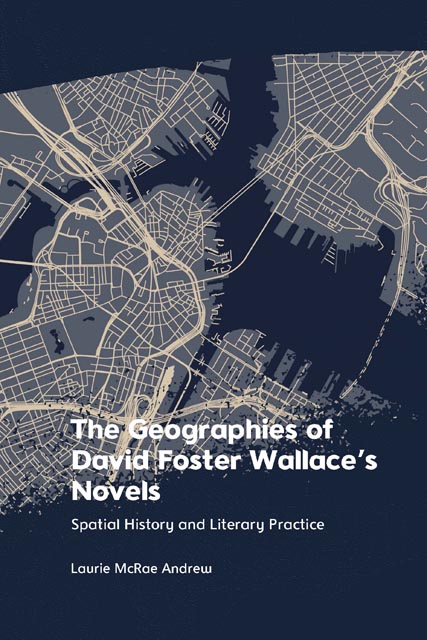Book contents
- Frontmatter
- Contents
- Acknowledgements
- Texts and Abbreviations
- Introduction
- 1 ‘This strange, occluded place’: Regional Geography, the Midwest and The Broom of the System
- 2 ‘Abroad in the urban night’ (I): Metropolis, ‘Postmetropolis’ and Infinite Jest
- 3 ‘Abroad in the urban night’ (II): Empathy, Community and the Image of the City in Infinite Jest
- 4 What is Peoria for? (I): Postindustrial Life and the Language of Place in The Pale King
- 5 What is Peoria for? (II): Peoria, the Edge City and The Pale King
- Bibliography
- Index
3 - ‘Abroad in the urban night’ (II): Empathy, Community and the Image of the City in Infinite Jest
Published online by Cambridge University Press: 13 April 2023
- Frontmatter
- Contents
- Acknowledgements
- Texts and Abbreviations
- Introduction
- 1 ‘This strange, occluded place’: Regional Geography, the Midwest and The Broom of the System
- 2 ‘Abroad in the urban night’ (I): Metropolis, ‘Postmetropolis’ and Infinite Jest
- 3 ‘Abroad in the urban night’ (II): Empathy, Community and the Image of the City in Infinite Jest
- 4 What is Peoria for? (I): Postindustrial Life and the Language of Place in The Pale King
- 5 What is Peoria for? (II): Peoria, the Edge City and The Pale King
- Bibliography
- Index
Summary
Introduction: Encountering the Metropolis
Wallace’s move to Boston had, as the previous chapter has shown, entailed a reframing of the question of how his literary practice could align with the social conditions that had emerged from the socioeconomic upheavals at the end of the twentieth century: a question that was now intimately bound up with the deep formal and representational problems that the ‘postmetropolitan’ city posed for the novel. The city appears in the early stages of Infinite Jest as a space of fragmentation, loss and nostalgia; but Joelle van Dyne’s broadcast had also signalled the prospect of a connective artistic practice embedded in the metropolis. Is this possibility a dead end for Jest, one that dissipates along with the crowd whose elision from the text reflects the social atomisation of the city? Despite the dominant sense of dissolution, the tentative urban excursions of Joelle and Don Gately in the opening half of the text also contain latent suggestions that a renewed juncture between city and novel might yet revive the metropolis as a shared environment, a lived social space. How the novel builds on this suggestion despite the predominance of fragmentation, and how it locates possibilities of community in the very metropolis that seems so inimical to collective life, is the question I explore in this chapter. And as a starting point, I want to return to Wallace’s own encounter with the social scene of Boston.
In Chapter 2, I emphasised the excitement Wallace expressed on first moving to the city in the summer of 1989; but this excitement proved short-lived, as a serious mental health crisis saw him hospitalised in late 1989 and 1991, before gradually returning to city life through Boston’s addiction recovery network and halfway house facilities. This experience perhaps explains his later reflection that ‘I don’t do well in big cities’, a sentiment that might seem to justify the view that Wallace’s attitude to metropolitan environments was essentially a negative one. But even this crisis, on closer inspection, took on a generative role in Jest’s development.
- Type
- Chapter
- Information
- The Geographies of David Foster Wallace's NovelsSpatial History and Literary Practice, pp. 104 - 141Publisher: Edinburgh University PressPrint publication year: 2022



